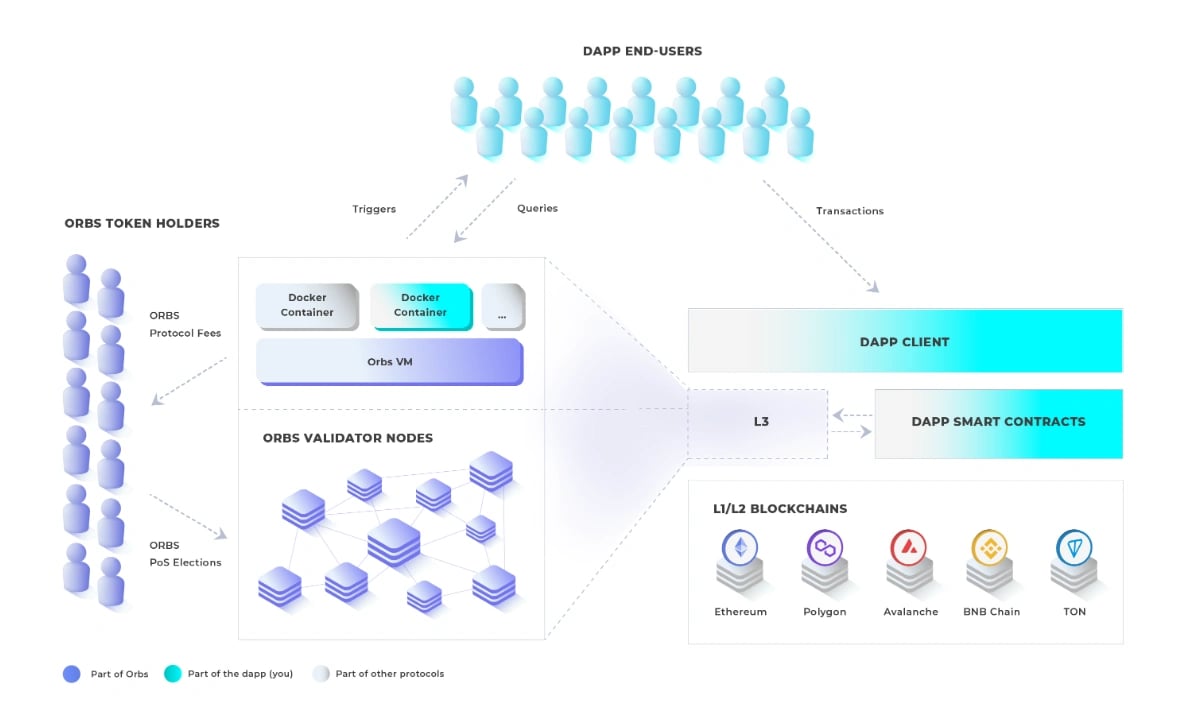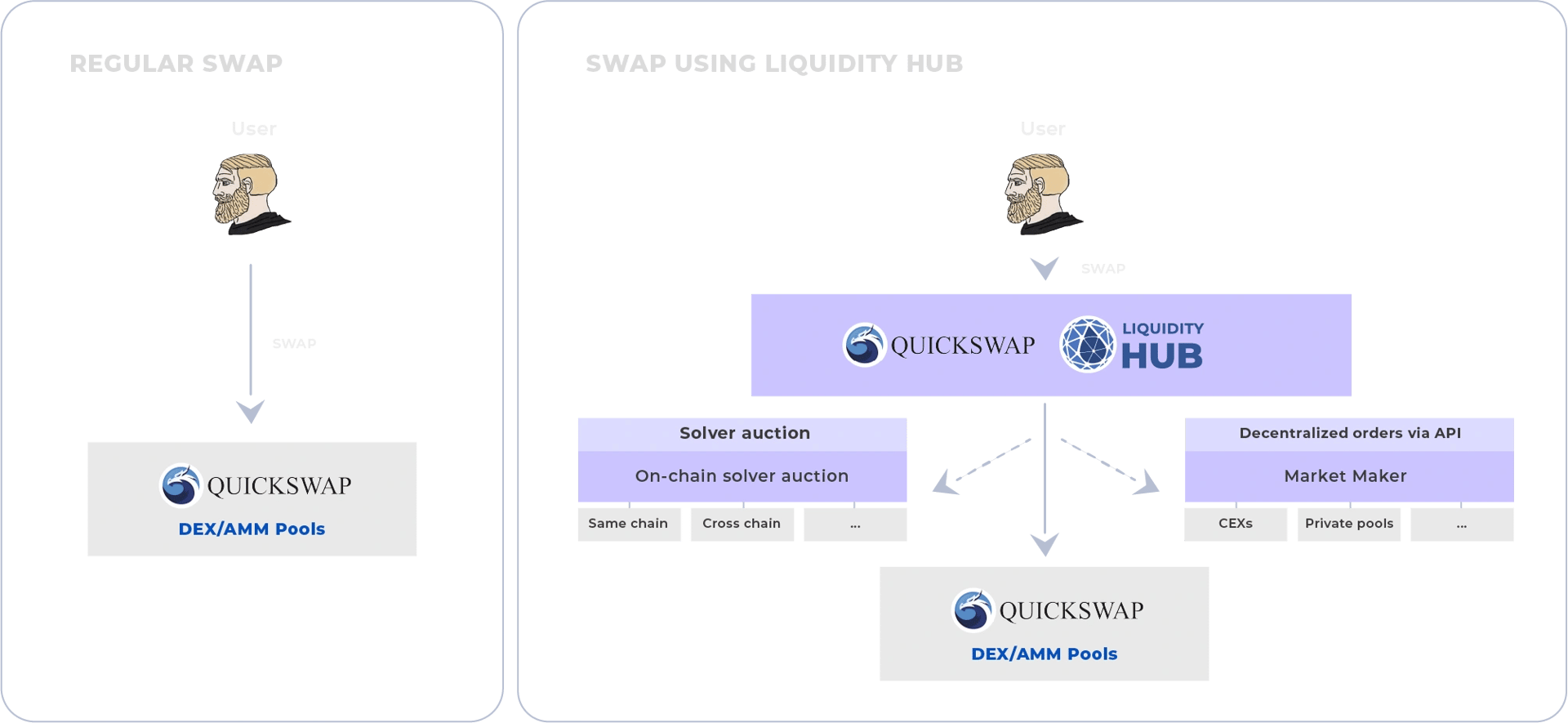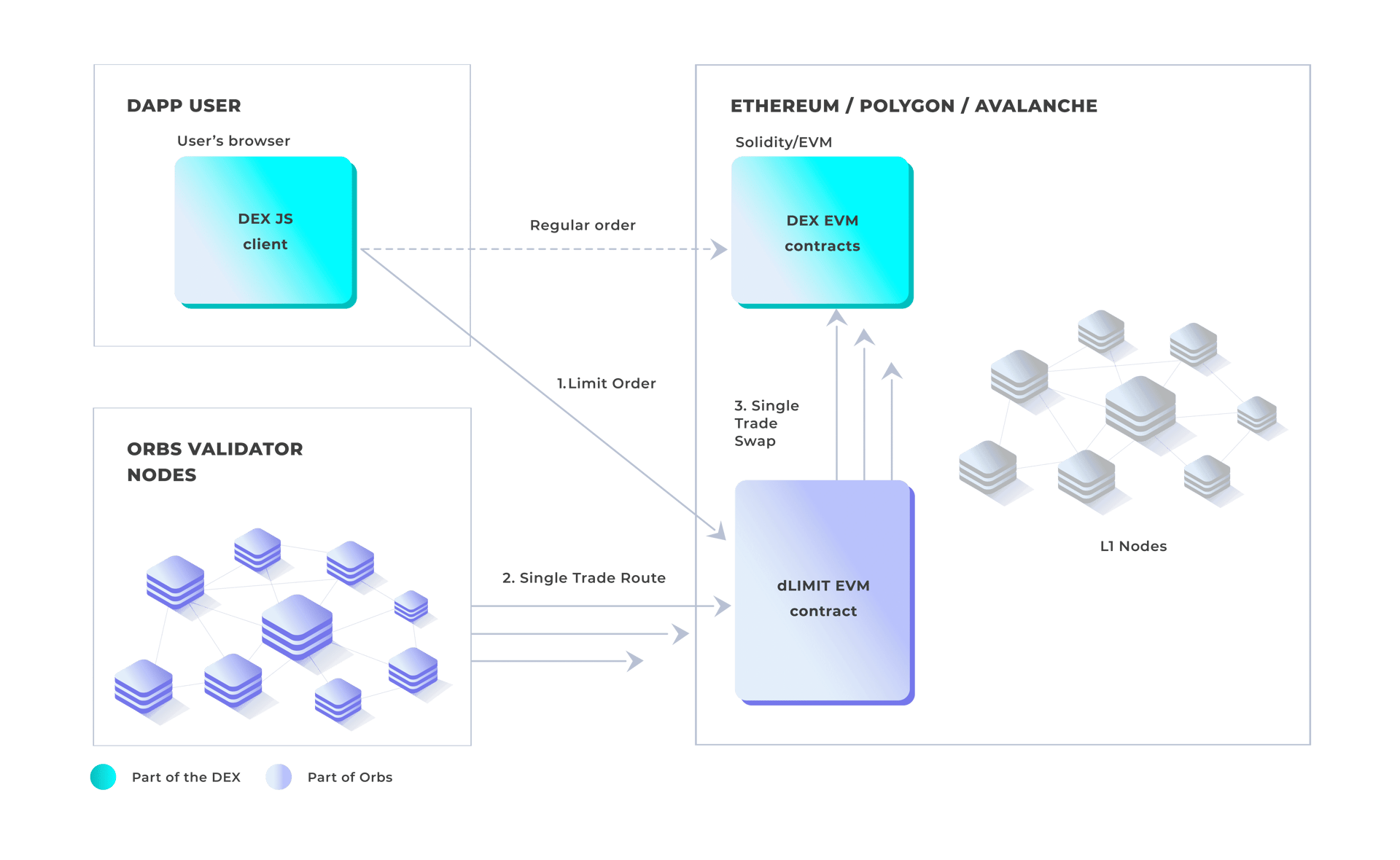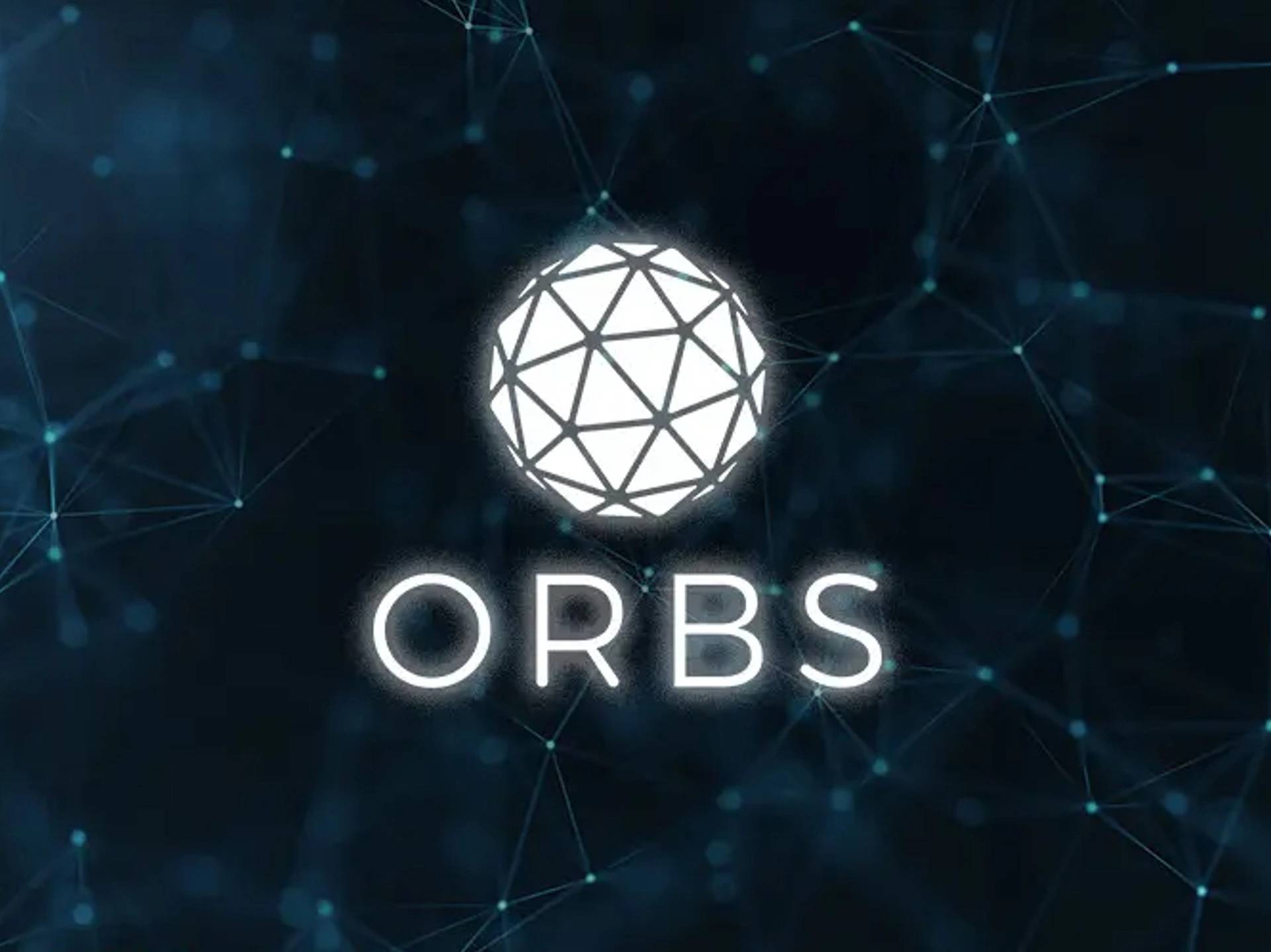Orbs
Orbs는 개방적이고 탈중앙화된 퍼블릭 블록체인 인프라로, 지분 증명(PoS) 합의를 사용하는 무허가 검증인들의 보안 네트워크에 의해 실행됩니다. 새로운 체인으로 유동성을 이동시키지 않고, 기존 L1/L2 솔루션과 애플리케이션 레이어 사이에서 작동하는 별도의 탈중앙화된 실행 레이어로 설정되어 계층화된 블록체인 스택의 일부를 구성합니다. [1]
“탈중앙화된 백엔드” 역할을 하는 Orbs는 기존 EVM 및 비-EVM 스마트 컨트랙트의 기능을 향상시키고 웹 3.0, DeFi(탈중앙화 금융), NFT(대체 불가능한 토큰) 및 GameFi에 대한 새로운 가능성을 열어주는 것을 목표로 합니다. [2]
개요
Orbs는 스마트 계약의 한계로 인해 프로젝트가 중앙 집중식 백엔드 인프라에 점점 더 의존하게 되면서 DeFi, Web 3 프로토콜 및 dApp(탈중앙화 애플리케이션)의 보안 및 거버넌스에 대한 증가하는 우려를 해결하기 위해 2019년에 출시되었습니다. Orbs 네트워크는 개발자가 레이어 3(L3) 분산 백엔드 서비스로 스마트 계약을 강화할 수 있도록 지원하는 분산 서버리스 클라우드 플랫폼 역할을 합니다. 이러한 서비스는 Orbs의 지분 증명 검증인(Guardian)에 의해 실행되어 중앙 집중식 백엔드 솔루션의 필요성을 없앱니다. 레이어 3 프로토콜인 Orbs는 기존 L1 및 L2 블록체인에서 실행되며 기존 DeFi 애플리케이션에 서비스를 제공하여 추가 분산화 및 기능 향상에 중점을 둡니다. [2][3]
탈중앙화 실행 서비스
Orbs Lambda
Orbs Lambda는 Orbs 네트워크에서 스마트 컨트랙트 실행을 간소화하고 향상시키기 위해 설계된 탈중앙화된 서버리스 클라우드 함수입니다. AWS Lambda와 개념적으로 유사하지만 완전히 탈중앙화되어 있으며, 개발자는 몇 줄의 JavaScript 또는 TypeScript 코드로 클라우드 함수를 구현할 수 있습니다. 이러한 함수는 예약된 간격, 다양한 L1 블록체인의 온체인 이벤트 또는 HTTP 요청에 따라 자동으로 트리거됩니다. Orbs Lambda는 기존 L1 스마트 컨트랙트를 보완하여 개발자가 탈중앙화를 손상시키지 않고 비즈니스 로직을 풍부하게 할 수 있도록 합니다. [8]
Orbs VM
Orbs VM(Orbs Virtual Machine)은 분산형 전용 가상 환경을 나타내며, Docker 기반 서비스와 유사하지만 분산화된 특징을 가지고 있습니다. 이 맥락에서 서비스는 컨테이너 내에 캡슐화되어 Orbs 네트워크에 배포되며, 네트워크 검증자에 의해 실행됩니다. 이러한 오케스트레이션은 AWS EC2 컨테이너 서비스에서 볼 수 있는 자동화와 유사합니다. 그러나 Orbs VM을 차별화하는 것은 완전한 투명성과 분산화이며, 이는 수많은 독립적인 네트워크 검증자를 활용하여 실행을 보장합니다. [10]

주요 기능
- 프로그래밍 언어의 유연성: Orbs VM의 주목할 만한 특징 중 하나는 프로그래밍 언어에 대한 유연성입니다. Docker와 같은 업계 표준 컨테이너를 채택하여 개발자가 Go, C++, Rust, JavaScript, Python, Java와 같은 친숙한 언어를 사용할 수 있도록 합니다. 이를 통해 특수한 스마트 계약 언어 또는 특이한 툴체인을 익힐 필요가 없어 기존 지식을 가진 개발자가 쉽게 접근할 수 있습니다.
- 지속적인 가용성: Orbs VM은 이벤트 중심 시스템과 달리 "항상 켜짐" 모드로 작동합니다. VM 내의 서비스는 지속적으로 활성 상태를 유지하며 컨테이너 자체 내에서 이벤트 중심 로직을 구현할 수 있습니다. 예를 들어 서비스는 새로 게시된 블록을 지속적으로 스캔하고 내용을 면밀히 조사하여 여러 L1 블록체인을 적극적으로 모니터링할 수 있습니다.
- L1 스마트 계약 보완: Orbs VM은 기존 L1 스마트 계약을 대체하는 것이 아니라 보완하도록 설계되었습니다. 탈중앙화를 손상시키지 않으면서 스마트 계약의 기능을 향상시킵니다. 중앙 집중식 백엔드를 가진 DApp은 Orbs VM으로 전환하여 제품에서 중앙 집중식 병목 현상을 제거할 수 있습니다.[10]
사용 사례
- 가격 피드: Orbs Lambda는 Coinbase, Binance, CoinMarketCap과 같은 외부 소스에서 실시간 데이터를 가져와 dApp에 정확한 가격 피드를 제공할 수 있습니다. Lambda 함수는 주기적으로 온체인에서 가격을 업데이트하고 집계하여 데이터 정확도를 향상시킵니다.
- 모바일 알림: Aave 또는 Compound와 같은 DApp은 Lambda를 사용하여 특정 온체인 조건이 충족될 때 사용자에게 모바일 푸시 알림을 보낼 수 있습니다.
- 크로스 체인 거버넌스: Orbs Lambda는 여러 블록체인에서 데이터에 액세스하여 dApp이 과거 잔액 스냅샷을 기반으로 거버넌스 투표를 계산할 수 있도록 합니다. 서로 다른 블록체인의 사용자가 투표에 참여하여 탈중앙화를 향상시킬 수 있습니다.
- 자동 복리: Lambda 함수는 자동 복리와 같은 DeFi 볼트 전략을 자동화합니다. 트리거를 모니터링하고 최상의 연간 백분율(APR)을 기반으로 보상 재투자 또는 자산 재할당과 같은 온체인 작업을 실행합니다.
- TWAP 실행: Orbs Lambda는 시간 가중 평균 가격(TWAP)을 구현하여 DeFi에서 대규모 거래를 최적화합니다. 거래를 시간 경과에 따라 더 작은 부분으로 나누어 가격 영향을 줄이고 손실을 최소화합니다. Lambda는 선행 매매를 피하고 시장 가격을 유지하기 위해 거래 매개변수를 조정합니다.[9]
Orbs에 의해 구동되는 프로토콜/제품
Liquidity Hub
Liquidity Hub는 자동화된 마켓 메이커(AMM) 위에서 작동하는 탈중앙화된 최적화 레이어입니다. 온체인 솔버 경매와 API를 통한 탈중앙화된 주문을 통해 추가 유동성 소스에 접근합니다. 이러한 소스에는 온체인 유동성을 사용하는 타사 솔버와 탈중앙화된 지정가 주문을 활용하는 기관 트레이더가 포함됩니다. 이를 통해 DEX는 거래를 보다 효율적으로 실행하려고 시도하여 AMM 가격의 영향을 줄일 수 있습니다. Liquidity Hub가 더 나은 가격을 찾지 못하면 거래는 평소와 같이 AMM 계약을 통해 진행됩니다. 그렇게 함으로써 이 레이어는 DeFi의 파편화된 유동성 문제를 완화하여 DEX가 외부 유동성 소스를 활용하여 스왑에 대한 더 나은 가격을 제공할 수 있도록 하는 것을 목표로 합니다. [11]

dTWAP 프로토콜
dTWAP 프로토콜은 고급 시간 분산 알고리즘 거래를 실행하기 위한 탈중앙화 온체인 솔루션을 도입하여 대규모 주문이 시장에 미치는 영향을 줄입니다. 이는 가격 영향을 최소화하기 위해 주문을 시간 경과에 따라 실행되는 더 작은 거래로 나누는 시간 가중 평균 가격(TWAP) 전략을 활용합니다. 이 프로토콜은 스마트 계약과 허가 없는 입찰자를 사용하여 완전히 탈중앙화되고 안전하게 작동하도록 설계되었습니다. 주요 구성 요소로는 매개변수 입력을 위한 사용자 친화적인 UI, 주문을 보유하고 실행하는 dTWAP 스마트 계약, 정직한 입찰자 역할을 하는 Orbs Guardians, 경로 최적화를 위한 선택적 타사 라우터가 있습니다. 궁극적으로 dTWAP 프로토콜은 탈중앙화 거래소의 유동성과 거래 효율성을 향상시키는 것을 목표로 합니다. [12][13]
dLIMIT 프로토콜
dLIMIT 프로토콜은 DEX/AMM에서 지정가 주문을 효율적이고 안정적으로 실행하기 위한 탈중앙화된 온체인 솔루션을 제공합니다. DeFi에서 구현하기 어려울 수 있는 기존 지정가 주문과는 달리, dLIMIT 스마트 계약은 최적의 실행 가격과 공정한 수수료를 보장합니다. 영어 경매 입찰 메커니즘을 사용하여 사용자가 지정한 제한 가격에 가까운 가격으로 주문을 체결합니다. Orbs 네트워크의 PoS 메커니즘은 높은 중복성과 신뢰성으로 지속적인 운영을 보장합니다. 누구나 Orbs 네트워크 검증인과 함께 테이커로 참여하여 DEX에서 지정가 주문에 대한 사용자 보호 및 탈중앙화된 실행을 제공할 수 있습니다. [14]

Open DeFi 알림 프로토콜
Open DeFi 알림 프로토콜은 DeFi 공간 내에서 체인 상 이벤트에 대한 탈중앙화되고 비용 없는 모바일 알림을 제공하는 커뮤니티 주도 이니셔티브입니다. 사용자는 간단한 JavaScript web3 클래스를 통해 선호하는 프로젝트에 대한 알림을 쉽게 추가할 수 있습니다. 알림 스키마는 Orbs Network의 프로토콜 경고 노드에서 지속적으로 처리됩니다. 이러한 경고 노드는 공용 검증자에 의해 실행되어 안전하고 안정적인 서비스를 제공합니다. 이러한 알림에 액세스하기 위해 사용자는 오픈 소스 iOS 및 Android 앱을 사용하거나 Discord, Twitter 및 Telegram과 같은 다양한 통신 플랫폼을 통해 알림을 받을 수 있습니다. [15]
TON.vote
TON.vote는 완전한 탈중앙화 DAO 투표 플랫폼으로, TON 생태계를 위해 독점적으로 설계되었으며, TON 재단의 공식 DAO 투표 플랫폼 역할을 합니다. 탈중앙화 및 투명성 원칙을 준수하면서 TON DAO, 프로젝트 및 기타 TON 관련 커뮤니티의 거버넌스 요구 사항을 해결합니다. 분산 스토리지를 활용하여 TON 스마트 계약 및 IPFS에 의존하여 투표 데이터의 무결성을 유지합니다. 이 시스템은 TON 메인넷 위에 구축된 2차 논리적 "블록체인" 역할을 하며, 블록은 매일 마감됩니다. Orbs Network의 검증인은 새로운 블록을 추가하는 데 중요한 역할을 수행하여 탈중앙화 및 신뢰를 보장합니다. 또한 이 플랫폼은 사용자가 투표 결과의 진위성을 독립적으로 확인할 수 있도록 신뢰할 수 없는 증명을 가능하게 합니다. [16]
주요 기능:
- 탈중앙화: TON.vote는 모든 사용자가 독립적으로 투표의 무결성을 검증할 수 있도록 하여 거버넌스 프로세스의 투명성과 신뢰를 보장합니다.
- 가스 없는 투표: 사용자가 투표에 대한 가스 수수료를 지불할 필요가 없도록 하여 사용자 참여를 향상시키기 위해 오프체인 투표를 지원합니다.
- 고급 투표 전략: 사용자는 스테이킹된 토큰만 고려하거나 최소 지갑 잔액과 같은 투표력 계산 조건을 설정하여 봇에 의한 잠재적 남용을 방지할 수 있습니다.
- 스냅샷: 토큰 보유량은 특정 과거 블록에 기록되어 투표 조작을 방지합니다.
- 조작 모니터링 및 방지: 이 플랫폼은 봇 퇴치를 위해 최소 잔액 요구 사항을 추가하는 등 투표 과정에서 예상치 못한 이벤트와 남용을 해결하는 메커니즘을 제공합니다.
- 검증 가능한 UI: Orbs L3 기술은 사용자 인터페이스에 표시된 투표가 스마트 계약에 저장된 데이터와 정확히 일치하는지 확인하여 투명성과 신뢰성을 향상시킵니다.
- 사용자 정의 가능한 테마 공간 페이지: TON.vote는 커뮤니티가 로고와 색 구성표로 사용자 정의 가능한 프로젝트 페이지를 만들 수 있는 공간을 제공하여 커뮤니티 참여를 촉진합니다.[17]
TON 액세스
TON 액세스는 TON을 위한 탈중앙화된 HTTP API이며, 웹 브라우저에서 직접 블록체인 상태에 대한 HTTP 쿼리를 가능하게 하기 위해 TON dApp을 위한 탈중앙화된 RPC 네트워크 역할을 합니다. API 키 없이 무제한 익명 액세스를 제공하여 익명의 dApp 사용자를 위한 중단 없는 운영을 보장합니다. Orbs 검증자를 통해 dApp RPC 요청을 라우팅함으로써 TON 액세스는 단일 중앙 집중식 엔터티에 대한 의존성을 제거하고 TON 블록체인에 대한 탈중앙화된 액세스를 유지합니다. [18]
주요 기능:
- 제한 없는 접근: 초당 1회 요청으로 익명 사용자를 제한하는 toncenter와 같은 RPC 게이트웨이와 달리 TON Access는 이러한 제한을 두지 않습니다. 이러한 자유는 익명 사용자 기반을 가진 dApp에 필수적입니다.
- API 키 불필요: TON Access는 API 키 등록 없이 탈중앙화된 접근을 제공합니다. API 키는 종종 제한 사항이 있으며 클라이언트 측이나 서버 측에 안전하게 저장할 수 없습니다.
- 서버리스 운영: Dapp 개발자는 자체 RPC 백엔드 서버를 실행할 필요가 없어 서버가 가져오는 중앙 집중화를 피할 수 있습니다. 이를 통해 DevOps 가동 중단 시에도 사용자 자금에 대한 중단 없는 액세스를 보장합니다.
- 탈중앙화된 신뢰: 1억 달러 이상이 스테이킹된 Orbs 네트워크의 수십 개의 허가 없는 검증자를 통해 TON Access는 중앙 집중식 비즈니스 엔터티가 아닌 프로토콜에 대한 신뢰를 제공합니다.
- 높은 중복성: API는 여러 독립적인 Orbs 네트워크 검증자를 통해 작동하여 단일 실패 지점 없이 강력하고 탄력적인 서비스를 보장합니다.
- 광범위한 RPC API 지원: TON Access는 HTTP v2, v4 및 원시 ADNL을 포함한 모든 RPC API 버전을 지원하여 TON 생태계의 다양한 요구 사항을 충족합니다.[18]

네트워크 업그레이드
Orbs V1
2019년 3월에 도입된 Orbs V1은 Orbs PoS 프로토콜의 초기 구현을 나타냅니다. 이 버전에서 Orbs는 자체 가상 체인 내에서 PoS 선거를 실행했는데, 이는 당시 PoS 네트워크에서 일반적으로 사용되던 방법입니다. Orbs 검증인은 이러한 선거를 수행했으며, 이는 PoS 시스템에서 일반적인 접근 방식입니다. 그러나 이 접근 방식은 PoS가 본질적으로 주관적인 보안에 의존하기 때문에 PoW의 객관적인 보안보다 보안성이 떨어진다는 한계가 있었습니다. 이러한 제한에도 불구하고 Orbs V1은 Orbs가 PoS로 전환하는 기반을 마련했습니다. [25][26]
Orbs V2
Orbs V2는 2020년 11월에 출시되었으며, Orbs PoS 생태계의 중요한 진화를 나타냅니다. 주요 혁신은 이더리움의 PoW 보안을 Orbs PoS 모델에 통합한 것입니다. V1과는 달리, Orbs의 검증인에만 의존했던 V2는 선거 결과를 검증하기 위해 외부 사이드체인인 이더리움을 도입했습니다. 이더리움의 강력한 보안 기능을 활용하여 Orbs는 PoS 프로토콜의 무결성과 보안을 강화했습니다. 이더리움의 스마트 계약은 스테이킹, 위임 및 보상 분배를 관리하는 데 사용되어 사용자에게 안전하고 효율적인 환경을 보장합니다. [25][27][28]

Orbs V3
Orbs V3는 2022년 3월 29일에 출시되었으며, Orbs 메인넷 출시 3주년과 멀티체인 PoS의 첫걸음을 기념했습니다. Orbs는 PoS 선거를 폴리곤으로 확장하여 Orbs, 이더리움, 폴리곤의 세 체인에 걸쳐 PoS를 구현한 세계 최초의 사례가 되었습니다. Orbs V3의 주요 동기는 이더리움과 관련된 가스 비용 상승 문제를 해결하여 특히 소규모 스테이커 사용자의 접근성을 높이는 것이었습니다. 폴리곤의 확장성과 이더리움 스마트 계약과의 호환성을 활용하여 Orbs는 네트워크의 유용성과 효율성을 향상시키는 것을 목표로 합니다. Orbs V3는 여러 체인에서 스테이킹 및 위임을 위한 안전하고 비용 효율적인 환경을 보장하여 Orbs의 중요한 이정표가 되었습니다. [29][30]
ORBS 토큰
ORBS 토큰은 Orbs 플랫폼에서 제공하는 서비스를 활용하기 위한 주요 결제 수단 역할을 합니다. 사용자는 ORBS를 사용하여 합의 계층, 스마트 계약 및 합의 기반 스토리지와 관련된 작업을 실행하는 인프라 운영자(검증자)에게 보상할 수 있습니다. 또한 이 토큰은 네트워크 보안 및 거버넌스 결정을 담당하는 검증자 선출에 사용자를 참여시켜 Orbs의 지분 증명 생태계에서 중요한 역할을 합니다. [24]
ORBS 토큰은 이더리움 네트워크 내에서 ERC-20 토큰으로 기능하며 총 고정 공급량은 100억 개입니다. Orbs는 지속 가능한 전략을 채택하여 인플레이션 토큰 공급 방식을 피하고 운영 수수료를 통해 네트워크의 장기적인 생존 가능성을 유지합니다. 토큰 배포 이벤트(TDE)는 Orbs 네트워크의 초기 출시와 동시에 2019년 3월 28일에 발생했습니다. 이 배포 프로세스는 토큰을 해당 풀에 할당하여 Orbs 생태계의 개발과 성장을 촉진했습니다. [24]
토큰 분배
장기 보유 물량 (55%)
총 55억 개의 토큰으로, 토큰 분배 이벤트(TDE) 이후 55개월에 걸쳐 베스팅되었습니다. 이는 네트워크 개발, 생태계 확장 및 지분 증명 보상에 사용됩니다.
비공개 판매 (20%)
이 풀은 잠금 또는 베스팅 기간 없이 20억 개의 토큰으로 구성됩니다. 연구 개발, 핵심 기술 개발, 생태계 조성, 운영, 사업 개발 및 마케팅을 포함한 프로젝트 자금 조달을 목표로 하는 사전 TDE 비공개 판매의 일부였습니다.
팀 및 창립 파트너 (20%)
총 공급량의 20%를 나타내는 20억 개의 토큰은 TDE 이후 36개월에 걸쳐 분배되었으며, 초기 6개월의 락업 기간이 있었습니다. 이 토큰은 Orbs 팀원 및 창립 파트너에게 할당됩니다.
어드바이저 (5%)
이 풀에는 외부 프로젝트 어드바이저를 위해 TDE 이후 12개월에 걸쳐 베스팅된 5억 개의 토큰이 포함되어 있습니다.[24]
파트너십
2023년 7월 6일, Orbs는 Open DeFi Notification Protocol을 통해 Pendle Finance와 통합하여 생태계를 확장했습니다. Pendle Finance는 미래 수익률을 토큰화하고 판매할 수 있는 플랫폼을 제공합니다. 이제 Pendle 사용자는 "새로운 시장" 알림을 설정하여 Pendle Finance에 새로운 시장이 배포될 때 실시간으로 업데이트를 받을 수 있습니다. 이 파트너십은 Pendle 사용자를 위한 DeFi 기회 및 정보에 대한 접근성을 향상시킵니다. [19]
2023년 7월 17일, Orbs는 Chronos와 파트너십을 맺고 dLIMIT 및 dTWAP 거래 주문을 Chronos DEX와 통합했습니다. Arbitrum에서 가장 큰 DEX 중 하나인 Chronos DEX를 통해 트레이더는 고급 주문 유형을 사용하여 주문 가격을 보장하거나 대량 주문을 더 작은 거래로 나눌 수 있습니다. Chronos 사용자는 dLIMIT 및 dTWAP 주문 유형에 모두 액세스하여 주문 가격을 확보하거나 상당한 주문을 더 작은 거래로 나눌 수 있습니다. [20]
2023년 7월 20일, Orbs는 Open DeFi Notification Protocol을 통해 DeFi 기능을 더욱 확장하기 위해 Convex Finance와 파트너십을 맺었습니다. Convex Finance는 Curve.fi 유동성 공급자가 CRV 토큰을 잠그지 않고도 거래 수수료를 얻고 CRV를 늘릴 수 있도록 합니다. 통합을 통해 Convex 사용자는 "스테이킹 잠금 해제" 알림을 설정하여 CVX 토큰 잠금 기간이 끝나는 시점을 놓치지 않도록 할 수 있습니다. [21]
2023년 8월 21일, Orbs는 Open DeFi Notification Protocol에서 Curve Finance를 통합하여 전략적 파트너십을 체결했습니다. Curve Finance는 높은 유동성, 낮은 슬리피지 및 낮은 수수료 거래를 제공하는 저명한 DeFi 프로토콜입니다. ERC-20 토큰. 이 협력을 통해 Curve 사용자는 "스테이킹 잠금 해제" 알림을 설정하여 CRV 토큰 잠금 해제 기간에 대한 정보를 얻을 수 있습니다. [22]
2023년 9월 15일, ORBS 토큰은 Axelar의 Satellite 크로스 체인 브리지를 사용하여 Chronos DEX에서 사용할 수 있게 되었습니다. 이 통합을 통해 Ethereum, BSC 등 간의 토큰 스왑이 가능합니다. 이제 사용자는 Chronos에서 Orbs 풀을 스왑하고 유동성을 추가하여 DeFi 공간에서 토큰의 도달 범위와 유동성을 더욱 향상시킬 수 있습니다. [23]
팀
프로젝트의 핵심 팀은 텔아비브, 런던, 뉴욕, 도쿄, 서울 등지에서 활동하는 30명 이상의 헌신적인 기여자로 구성되어 있습니다.
창립자
- Daniel Peled: 대표 & 공동 창립자
- Tal Kol: 공동 창립자
- Netta Korin: 공동 창립자
- Uriel Peled: 공동 창립자
주요 팀 구성원
- Rotem Yakir: DeFi & NFTs 개발자
- Yuval Aviguy: 소프트웨어 엔지니어
- Doron Aviguy: 소프트웨어 엔지니어
- Ami Hazbany: 블록체인 개발자
